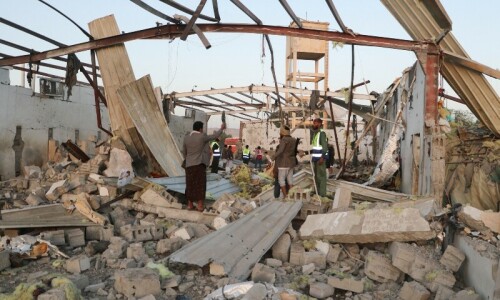ISLAMABAD: “I am satisfied that the UN commission did not exceed its mandate set out in the terms of reference. I stand by the report,” said a letter written by UN Secretary General Ban Ki-moon on July 9, 2010, brushing aside the PPP government’s concern over the world body’s inquiry report on the assassination of Benazir Bhutto.
The letter had been kept secret by the then and present governments for five years.
The UN commission had also offered to provide Pakistan material and details of the sources on the basis of which it had prepared the report.
In the letter, a copy of which is with Dawn, the UN chief had supported the commission and said it had worked within its mandate.
The former prime minister was assassinated in a gun-and-bomb attack soon after her public meeting at Rawalpindi’s Liaquat Bagh on Dec 27, 2007.
The UN commission had conducted the inquiry into facts and circumstances leading to the assassination. It cost the government $5 million.
Mr Ban wrote the letter in reply to Islamabad’s reaction in June 2010 to the report prepared at its request.
Pakistani authorities had rejected the UN report and alleged that it had maligned national institutions. They sought information from the UN about the commission’s methodology and a list of its sources.
Secretary General’s 2010 letter kept secret by PPP, PML-N govts
“I would like to thank you for your letter of June 14, 2010, regarding the commission of inquiry into the facts and circumstances of the assassination of former prime minister Mohtarma Benazir Bhutto,” the UN chief said in the letter.
He said: “The comments and observations attached to your letter raise concerns regarding the work of the commission. The letter states that the commission exceeded its ToRs (terms of reference) because of references to the Pakistan army and other institutions, that it should have sought more information from governments other than Pakistan, and that the commission did not provide adequate information regarding its methodology or list of sources of information which is affecting the Pakistani criminal investigation.
“I wish to express my strong support for the commission, and I believe that the commissioners carried out their work professionally and produced a report in fulfilment of its ToRs under difficult circumstances.”
Mr Ban said the ToRs of the commission, agreed between the government of Pakistan and the UN secretariat and noted by the Security Council, called for the commission to conduct an inquiry into the facts and circumstances of the assassination of Ms Bhutto.
“The report painstakingly sets out the facts regarding the assassination and provides an extensive description of the circumstances around the crime. The latter is a broad mandate that called for an inclusive approach to the inquiry. I am satisfied that the commission did not exceed its mandate as set out in its ToRs,” he added.
Responding to the concern expressed by Pakistan about international sources, the UN chief said the commission had contacted all international sources they were referred to by the Pakistani authorities, directly and indirectly, and rigorously obtained all information relevant to the inquiry that was available from them. “The investigation was indeed international in its scope and composition,” he added.
Regarding Pakistan’s request to get the material obtained by the commission for preparing the report, the letter said: “As far as sharing information such as documents and other materials that were obtained by the commission during the course of its operations, any request from your government will be considered in light of existing UN regulations, rules and practices that apply to the release of UN documents. The information collected by the commission now forms part of the UN archives.”
It further said: “The commission was established to assist your government in conducting its own investigations into the assassination of former prime minister (Benazir) Bhutto. Therefore, the UN will cooperate, to the extent possible, with any request for assistance emanating from a competent police, prosecutorial or judicial authority within Pakistan bearing in mind, however, the sensitive nature of the commission work. Any such request should be formally communicated through the permanent mission of Pakistan to the UN.”
Pakistan Tehreek-i-Insaf leader Shah Mehmood Qureshi, who was foreign minister in the PPP government, did not say anything when asked to comment on the UN letter.
PPP’s spokesman Senator Farhatullah Babar said the then government had accepted the report, but with some reservations. He was of the view that the UN commission had gone beyond its mandate and ToRs.
Published in Dawn, December 28th, 2015














































